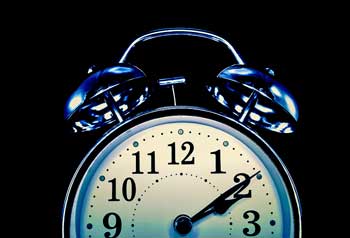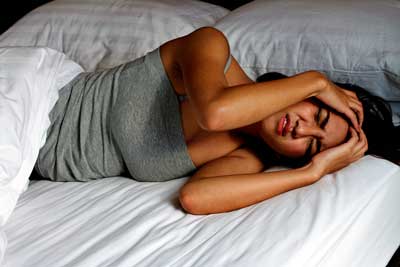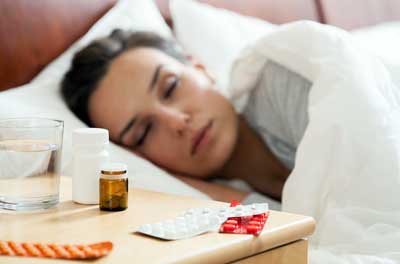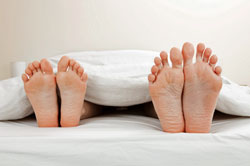

Unrefreshing Sleep – Not Poor Sleep – Synonymous with ME/CFS and FM
Poor sleep has been long held to be synonymous with ME/CFS and FM, and indeed the survey found that fairly poor (40%) and really poor (27%) sleep was common. However, about a third of the survey participants stated their sleep was OK (25%), pretty good (6%) or excellent (1%). Poor sleep is clearly not a necessary part of the diagnosis.
| Choice | Frequency |
| Really poor | 280 – 27% |
| Fairly poor | 409 – 40% |
| OK | 256- 25% |
| Pretty good | 64 – 6% |
| Excellent | 14 – 1% |
On the other hand, unrefreshing sleep is. The vast majority of respondents said they woke either exhausted (44%) or unrefreshed (42%). Eleven percent said they felt “so-so”, and only 2% said they felt “fairly good” or better upon awakening. The survey suggested that even people who felt their sleep was OK were still generally waking up feeling beat up for the most part.
As expected, given the alpha intrusions documented in fibromyalgia, interrupted sleep was very common, with most people (53%) waking up between 2-5 times a night and over thirty percent stating they wake up 5-9 times a night. A fairly large (11%) and quite unfortunate group that is apparently getting very little deep sleep stated they wake up 10 or more times a night.
Insomnia is not often mentioned as a major sleep issue, but it emerged as a very prominent issue with no less than 42% of respondents stating it was a “major” problem and 36% stating it was a “moderate” problem. Only 8% of respondents stated it was “not a problem”.
Sleep Times
Going to sleep very late can be a cause of poor sleep and fatigue because it throws your circadian rhythms out of whack. Most people went to sleep before midnight (73%), but a significant portion (23%) go to sleep after midnight and 9% stated they usually go to sleep after 2 am.
Early wakening was also a common theme with 20% of people stating they usually woke before 5 am and 29% between 5 and 7am. The percentage of late-wakening folks (10% waking after 11 AM) lined up well with the 9% that went to sleep after 2 am.
Sleep Duration
Almost half (48%) of the respondents reported they believe they get less than 5 hours of sleep a night with 7% stating they get less than 3 hours a night. About half (48%) reported they get relatively normal amounts of sleep (6-10 hours) and just 4% stated they get more than 10 hours.
Factors That Negatively Affect Sleep
We asked how much ME/CFS and FM patients felt a number of factors (activity levels, pain, emotional stress, diet, alcohol intake, etc.) negatively affected their sleep. We didn’t ask how frequently these factors occurred; we simply asked when they occurred and how much they negatively affected sleep.
| Negative Factors | Very Much | Somewhat | Not much | |
| Too much activity/exercise during the day | 407 | 310 | 352 | 119 |
| No exercise (e.g. walking) during the day | 128 | 369 | 523 | 164 |
| Emotionally stressful events | 740 | 338 | 94 | 24 |
| Pain | 763 | 307 | 114 | 13 |
| Large meals at night | 133 | 278 | 629 | 140 |
| Small meals at night | 44 | 165 | 803 | 159 |
| Drinking caffeinated beverages after the morning | 192 | 221 | 567 | 205 |
| Drinking alcohol | 146 | 148 | 450 | 410 |
| Going to bed after 11 or 12 pm | 242 | 261 | 529 | 158 |
| A partner who snores | 278 | 195 | 348 | 350 |
Pain and Emotional Stress Stand Out
In this mixed group of FM and ME/CFS patients pain and emotional stress were easily the two biggest factors cited as very negatively affecting sleep.
Pain
Sixty-four percent of the respondents said that pain “very much” negatively affected sleep, twenty-six percent said it “somewhat” affected sleep and only eight percent said it was not much of a factor. Pain was also the clearest-cut issue with only 13 people out of the almost 1200 respondents not being sure of the effect it had.
The results suggest that concentrating on reducing pain before sleep could be very important. Pain has long been known to negatively affect sleep. A recent study found that neuropathic pain activates a part of the brainstem (the locus coeruleus) that promotes wakefulness. Another study found that neuropathic pain induced the firing of serotonergic neurons, again in the brainstem, that increased wakefulness and reduced deep sleep. If these studies are correct it’s not the pain per se that’s keeping people awake, but the promotion of wakefulness by the brainstem. Bansai recently proposed brainstem problems could help explain the extraordinary debility and sensory problems often found in the most severely ill ME/CFS patients.
Dr. Bateman has suggested that the hypothalamic dysfunction could play a key role in ME/CFS and/or FM. The hypothalamus and the brainstem are two major determinants of wakefulness in the brain.
Emotional Stress
Sixty-three percent said that “emotionally stressful events” very much had a negative effect on sleep. Twenty-nine percent said they had somewhat of an effect and 8% said they did not have much of an effect.
Again, we don’t know how commonly these factors are affecting sleep. I, for instance, put emotionally stressful events as having very much of a negative effect, but these events happen rarely for me. When they do, though, they knock my sleep for a loop like nothing else.
Studies indicating that the flight/fight system remains on during sleep could provide a reason why emotional stress had such negative effects on sleep. A stressful event that enhances an already over-active system could make it more difficult for the system to calm down enough to enter sleep. Toni Bernhard’s blog ”
Toni Bernhard’s blog “Turning Straw Into Gold” and “The Last Best Cure” blog series are two places to pick up practices that can reduce emotional stress. (Toni’s latest book on a Buddhist approach to peace and well-being is titled, ironically, “How to Wake Up“.)
Activity Levels/Exercise Effects
Dr. Bateman warned that too much activity could exacerbate the “wired and tired” condition that’s so common in these disorders, and indeed 35% of the respondents stated that too much activity during the day negatively affected their sleep. A similar percentage said too much activity/exercise had “not much” effect on their sleep. Twenty-six percent said it had a somewhat negative effect on their sleep.
Too little activity/exercise has also been cited as potentially having negative impacts on sleep, but it only showed up as major factor (very much negatively affected their sleep) in 13%. Thirty-seven percent said that doing too little activity did somewhat negatively affect sleep, while 52% did not find that it was an issue.
Others
None of the other potentially negative factors had large effects on sleep for most people.
Meals – Large meals at night are often cited as a no-no and some people (13%) felt they very negatively affected their sleep, but most people (63%) did not feel they had much of an effect.
Small meals – I often have trouble going to sleep if I don’t have a robust meal in the evening, but only 4% reported that small meals negatively affected them.
Treatment
Sleep Drugs
Sleep drug use was not particularly high. The only drugs more people had tried than had not tried were antihistamines. In general about a third of the respondents stated they had tried any one drug, with less than ten percent trying Seroquel, Sinequan, or Doxepin elixir.
They weren’t missing much. It’s true that for some people the sleep drugs work wonderfully, but only a small percentage – generally less than 10 percent – of respondents were so lucky.
Ambien was rated to be very effective by the highest percentage of responders at 19% with Klonopin second at 15%.
Most sleep drugs (7/11) had more reports of being “very harmful” than being “very effective” with Lyrica (30%), Neurontin (20%), Seroquel (32%), Sinequan (24%), and Xyrem (22%) having the highest percentage of “very harmful” ratings. Lyrica had among the lowest “very effective” ratings (6%).
A substantial number of people (25-40%), however, found sleep drugs to be at least “somewhat effective.” Klonopin and Ambien (53%) were tops in the effectiveness category with antihistamines (48%) and Flexeril, a muscle relaxant, coming in close behind (47%). Flexeril is commonly used off-label in FM to reduce pain, and this survey suggests it has a major positive effect on sleep in ME/CFS and FM.
The most surprising result was the very low success rate (2% “very effective”) of one of the most highly touted and most expensive sleep drugs to come out in memory – Xyrem. Twenty-two percent found it to be very harmful. Only 44 people had tried it, however. [Xyrem is also extremely expensive, and is only available from one pharmacy in the United States. Years ago it could be purchased at health-food stores and was quite cheap… until it got a reputation as a “date-rape” drug. Now it’s $2000-$3000 for a 30-day supply – Ed.]
| Drugs | Very effective | Somewhat Effective | Not Effective | Somewhat harmful | Very harmful | |
| Antihistamines | 35 (5%) | 286 (43%) | 270 | 45 | 29 (4%) | 424 |
| Ambien (Zolpidem) | 70 (19%) | 128 (34%) | 78 | 50 | 47 (13%) | 707 |
| Desreyel (Trazodone) | 34 (9%) | 78 (26%) | 81 | 45 | 62 (21%) | 753 |
| Elavil (Amytriptyline) | 44 (8%) | 174 (33%) | 162 | 70 | 83 (16%) | 571 |
| Flexeril (Cyclobenzaprine) | 32 (10%) | 123 (37%) | 114 | 36 | 31 (10%) | 729 |
| Klonopin (Clonezapam) | 46 (15%) | 116 (38%) | 82 | 23 | 35 (15%) | 763 |
| Lyrica (Pregbalin) | 23 (6%) | 93 (23%) | 125 | 43 | 120 (30%) | 677 |
| Neurontin (Gabapentin) | 33 (8%) | 107 (26%) | 147 | 46 | 85 (20%) | 663 |
| Seroquel (Quetiapine) | 17 (13%) | 31 (23%) | 29 | 13 | 42 (32%) | 916 |
| Sinequam (Doxepin elixir) | 9 (8%) | 27 (24%) | 28 | 21 | 27 (24%) | 933 |
| Xyrem (Sodium oxybate) | 1 (2%) | 5 (11%) | 19 | 9 | 10 (22%) | 996 |
Supplements, including Herbs
If there were few really effective sleep drugs, there were even fewer really effective supplements. Melatonin, as expected, was the most commonly tried supplement (n=646) and was the most effective, but was still judged “very effective” by only 11%. No other supplements had more than 6% of respondents state they were “very effective” and most people stated they were not effective.
The good news is that from 30-40% of people found Melatonin, valerian root and L-tryptophan to be at least “somewhat effective,” and negative effects on sleep were much lower than seen in prescription sleep drugs.
| Supplement | Very effective | Somewhat effective | Not Effective | Made sleep somewhat better | Made sleep much worse | |
| Melatonin | 68 (11%) | 245 (38%) | 266 | 35 | 32 | 485 |
| Valerian Root | 12 (3%) | 128 (30%) | 234 | 26 | 33 | 672 |
| L-tryptophan | 15 (6%) | 73 (28% | 152 | 9 | 12 | 836 |
| Kava kava | 3 (2%) | 26 (17%) | 111 | 5 | 10 | 941 |
| Chamomile tea | 5 (1%) | 150 (22%) | 504 | 13 | 7 | 454 |
Others
Investing in a good sleep mattress, while not cheap, does appear to work. It had one of the highest (16%) “very effective” ratings and easily the highest overall effectiveness rating (very + somewhat effective = 67%) of any approach. Raising the head of the bed had a low very effective rating (5%) but forty-one percent of respondents stated it was at least somewhat effective, and it’s so easy to do it that everyone should probably give it a try. About 25% of people taking the survey had tried a sleep app and few found it very effective, but 31% found it at least somewhat effective. Since a sleep app is a one-time inexpensive purchase, it might be worth giving a try.
| Very effective | Somewhat effective | Not Effective | ||
| Raising head of bed a couple of inches | 37 (5%) | 205 (36%) | 327 | 615 |
| Investing in a good sleep mattress | 146 (16%) | 480 (51%) | 313 | 256 |
| Using a sleep app to determine what most effects your sleep | 13 (6%) | 58 (25%) | 162 | 938 |
Sleep Hygiene
Most people, contrary to some physician’s statements, have actually tried good sleep hygiene practices.
| I have tried the following good sleep hygiene practices | yes | |
| Set regular sleep times | 1058 | 134 |
| Not napping for long periods in later part of day | 1024 | 171 |
| Going to bed only to sleep | 897 | 299 |
| Keeping light levels in the bedroom low | 1108 | 90 |
| Not watching TV or playing computer games two hours before bedtime | 579 | 614 |
| Doing meditation or mindfulness exercises before sleep | 681 | 511 |
| Taking a warm bath before sleep | 660 | 529 |
As with most other treatments, few (6%) found them to be “very helpful”, a significant percentage (34%) found them to be “somewhat helpful”, while most (60%) found them to be “not that helpful”.
Major Sleep Improvement Has Relatively Modest Effects on Health
About two-thirds of the people taking the survey stated they had “greatly improved” their sleep. The fact that most people still did not feel they had OK or good sleep suggests, however, that some people who had experienced real improvements still had significant sleep issues.
| If you have greatly improved your sleep tell us what effects it had on your health | Great improvement | Moderate improvement | Small improvement | |
| Fatigue | 92 (12%) | 196 (26%) | 198 | 276 |
| Pain | 63 (8%) | 186 (25%) | 188 | 310 |
| Clarity of Thought | 110 (19%) | 203 (35%) | 180 | 266 |
| Activity level | 76 (10%) | 199 (34%) | 211 | 273 |
| Overall well-being | 119 (16%) | 212 (28%) | 204 | 231 |
Greatly improving sleep had a moderate to great improvement for about 30-50% of patients with regard to any symptom. Clarity of thought was the symptom most often improved while pain was the least affected.
Most people (50-70%), however, reported either small improvement or no improvement on their symptoms after “greatly improving” their sleep – a surprising finding that underscores the fact that ME/CFS is much more than a sleep disorder.
The modest impact “great” sleep improvement had on fatigue, pain, and other symptoms for many suggests sleep therapies are, like most treatments, band-aids that are helpful but don’t begin to get at the causes of ME/CFS or FM. To really fix the possibly unique set of sleep problems found in ME/CFS and FM, you need to fix ME/CFS or FM.
Conclusions
No home runs were found in the sleep treatments. A small percentage (<10%) of people do experience great relief from drugs, supplements or other means of helping sleep, but when help comes for the vast majority of people it comes in smaller bites. The good news is that from 30-50% of the people trying almost every treatment found that it was at least “somewhat helpful”. The bad news is that from 50-70% of responders found the treatment was not effective or made them worse.
The fact that many factors were at least somewhat effective suggests that putting a variety of factors together – say, good sleep hygiene, a drug or supplement that works, investing in a good mattress, raising the head of the bed – might end up with greatly improved sleep.
Chronic fatigue syndrome and fibromyalgia are clearly, however, much more than about poor sleep. While improving sleep can be helpful, until the core issues of these disorders are addressed, most people with the disorders will have significant troubles with fatigue, pain, as well as other issues.
More Resources
- Health Rising’s ME/CFS and FM Sleep Resource Center
- Other drugs ME/CFS and FM patients said improved their sleep
- Drug/Supplement combinations ME/CFS and FM patients said improved their sleep
- Dr. Teitelbaum and maximizing the use of sleep drugs













I have greatly improved my sleep by earthing. I wear a wristband at night which is plugged into the ground socket of a standard AC outlet. This is, by far, the best thing I’ve ever tried, and it’s cheap. I’ve suggested it to others, and they have had the same remarkable results. You can find the wristbands at GoEarthing.com. I recommend getting the two-pack.
Michael, what exactly does it do for you? Help you sleep or help with pain also?
Great survey and analysis. So interesting how similar yet different we may all be. While some doctors caution against napping during the day, saying that it may make it harder to sleep at night, I encourage everyone to find out for themselves. For me, if I don’t nap, I don’t sleep. When I skip my nap I must then have to tap into the adrenal system for a second (or third or fourth!) wind, and then I’ll be awake until the wee hours of the morning. If I nap, that second wind doesn’t kick in and I will sleep better that night. Maybe not well, but better. For some, it could be that napping makes it harder to sleep at night, but I think it’s highly individual and I’d encourage people to listen to how their body responds to napping/sleeping over a sleep hygiene theory that may not work for them.
I agree! Do what works. Find your best sleep rhythm. Lately I’ve been waking up around 3 am, doing some work hitting the sack about 5 and then getting up about 8 – it seems to work for me.
I try not to sleep during the day and usually end up going to bed around 8.30, sometimes a lot earlier. There are days that I have to sleep, mostly in the afternoon but sometimes rarely in the morning. These days I will go to bed a bit later, say 10ish. The important thing is that we need to listen to our bodies and when we need to sleep then we should. But not for too long. That also is important I think.I agree with what you say.
Like most FM sufferers, I live with varying levels of pain every day.
But it isn’t until I get 8-9 hours of deep, restorative, uninterrupted sleep that I realise how much Sleep affects my daily routine.
Last week I had a long acting local anaesthetic prior to a cortisone injection deep into my troublesome left hip joint (which had been restricting my walking). That night the soreness of the injection site was an issue, but the next night, I slept 10 solid hours of uninterrupted deep sleep and woke feeling no less than euphoric at the 100% pain free day that followed. It’s not until one has the perfect night and the perfect day that one realises how much they are affected by their sleep patterns.
I still say lack of deep restful Sleep is one of my major problems. Even as a child/teenager I didn’t find it easy to get up in the morning. I was never one of those children who got up early and raced around with plenty of energy.
To be honest, I think insufficient sleep is a major problem for many normal healthy people too. Excess Caffeine, ‘power’ drinks, using the computer late at night (or for too many hours stimulating the brain), excess drama or violence in the media, poor diet, stressful job and a whole host of reasons need to be addressed before the majority of the population get what they need in terms of rest.
All the body’s main organs need time to recharge during sleep, so it’s not surprising that there is widespread DIS-ease in the world today, let alone us chronic pain/fatigue sufferers.
We can get so used to pain and all we completely forget what it’s like not to have it.
I have been using Xyrem, (sodium oxybate) for over eight years. It’s been a life-saver for me and I don’t understand why this poll doesn’t express this. It’s given me the deep, restorative sleep that I cannot get without it!
I don’t understand it either quite frankly since I’d heard nothing but good about it. It might just be a statistical quirk – not many people had tried it. Glad you it works for you though. I’m sure it works for many others.
I tired Xyrem in its early days—could not get to sleep on recommended dose. Their lab (not my physician) told me to double dose. Started sleeping but had crippling headaches. Am still seeking sleep years later, but I quit Xyrem after 10 days. Just could not stand so much pain. My physician thought I’d given it an adequate trial–it just wasn’t for me!
I tried Xyrem, but only once. It paralyzed my body but did not make me sleep. The experience for me was horrific. I was really scared. We’re all different, but I wouldn’t recommend Xyrem to anyone, based on my experience.
Excellent reporting, as always Cort! Great comments here too. I am definitely in the very poor sleep category. I have tried many meds and supplements and a combo supplement of melatonin, a small amount of 5-htp, valerian, etc. + a supplement from Kanion called Corydalis and Angelica has been helping a lot lately. I might need to try klonopin again though or flexeril.
Thanks again for all you do Cort. You are giving us a voice that that has been silent far too long. Many of us have been so “sick” that even keeping our thoughts together enough to write comments is a challenge! I can’t imagine trying to keep up on all the studies and blogs to report them like you do. Sleep has always been an issue for me, starting when I was a small child. Trazadone has been a lifesaver for me, but doesn’t reduce pain. Good sleep does help my attitude though, helps get me through the day. I’m happy to do these studies, and really interested in the results. I know they are very unofficial, but I feel all knowledge of these diseases (ME/CFS, Fibromyalgia) can be helpful. THANK YOU SO MUCH.
Thanks Patty! I appreciate it.
Watching my sleep this week I realized I usually go to bed feeling OK. I usually go to sleep right away. I usually wake up a couple of times in the night but can usually quickly go back to sleep – and I wake up usually in pain!
Go figure…
Trazodone did seem to “work” for me, as an addition to Ambien, but I developed a great deal of joint pain over my time on it and my doctor AND I thought it best to dump it!!
Hi Cort– thanks for posting the results . I took the survey and noted that before I started taking Lo Dose Naltrexone (4.5 mg at bedtime) , my sleep was HORRIFIC. I did a sleep study and they found “94 events”…meaning I woke up 94 times that night. I know for a fact it was d/t pain throughout my whole body: muscles, fascia, tendons, joints, pelvis, etc. After the sleep study at Stanford (Palo Alto, CA), I met with Dr Sean Mackey in the Pain Dept. He rx’d LDN and I cannot even BEGIN to tell you the immense improvement in sleep, pain, fatigue, etc. Took about 6 weeks to kick in, but I will never, ever stop taking this compounded medication. It has taken care of 95% of my pain, fatigue, sleep issues and malaise. It is a miracle to me…and I’m incredibly grateful to meet with Dr Mackey. This changed my life.!!
Sleep studies are revealing. I was told the spasms in my legs caused me to wake up every minute.
Years later I have found that when my legs get warm at night they hurt more and wake me up.
If I switch beds the cool sheets allow me to sleep again. Most nights are three bed nights.
If I change beds the cool sheets allow me to fall asleep again. Mist nights are a 3 bed night
And what is LDN? I’ve just joined this blog/newsletter and I’m finally finding fellow sojourner in addressing my issues. I’ve been dx with fibromyalgia and not officially CFS, which I believe I have. Exercise, over fatigue exacerbates everything. ..pain, fatigue that’s bone crushing in its scope. When it’s too much of an energy drain to even shower or brush your hair, or fix a simple meal, or your sleep habits are so poor . I can count on one hand ,in a years time, that I may feel somewhat refreshed…or wake up pain free.
Should have put LDN in the survey! I hope others read this and give it a shot.
Is LDN controversial or not approved??? I’ve been working with a number of physicIans for 11 years now and it’s not something any of them suggested??
I’ve been trying to get LDN for four years because it is used for neuropathic itching. No one in the Boston area will prescribe it.
I’m surprised that Lyrica was so unsuccessful. It’s one of the few meds that has has helped my neuropathic itching and sleep. Also, doxepin, which I was given for itching, is used for sleep. It has a very high level of antihistamine, so that makes sense.
The circadian rythym factor is interesting. Since I’ve been a teenager (I’m seventy now) I’ve been a night owl. One wonderful sleep specialist tried to change me into a lark. I’d be in bed at 10 p.m. staring at the ceiling. Even when I was well and had a job that demanded I be up at 6:30a.m. I couldn’t fall asleep until after Johnny Carson’s monologue: 11:45 p.m.
I’m passing this on to the two sleep specialists I have seen.
Sometimes I would take enough sleep meds to put all of Boston to sleep and I’d be wide awake. The next day was useless..
What is LDN?
LDN is low dose naltrexone. You purchase it from a compounding pharmacy. Haven’t tried it yet, but from my research seems best to titrate dosage up to 4.5 mg starting from 1.5 mg. Patients either feel it really works or is the worst drug they’ve ever taken. See Cort’s blogs about it
I agree with Carollynn, listen to your body and sleep when it tells you to. I have to take what I can get and be glad about it! I’ve tried every trick in the book to try to sleep during “normal” hours but I inevitably end up sleeping during the day again. Regardless of whether I nap or not. So I’ve learned that it is just best to sleep when it seems I can at all. Forget what time of day or night it is, if I think I can sleep, I go for it!
Is it Painsomnia? Yes, most of the time. But then again even when my pain is at a level I can cope with, and I need sleep, it doesn’t seem to matter. Usually I am up way too many hours and finally sleep because I pass the heck out. No matter what I do, or try, sleep is the bane of my existence. Elusive as a unicorn, a myth, a wish unfulfilled.
Medication helps, but only sometimes. Waking up exhausted and unrefreshed even after an unheard of 8 hours of consecutive sleep is usual for me. I just wish someone would figure it the heck out so I could get my life back! Please?
something else that is worth trying for evryone is vitamin D supplements or narrowband vitamin D lamps http://www.solarcsystems.com/lamps-for-vitamin-d.html
http://drgominak.com/vitamin-d-3/
My sleep is much better when I am abroad in a sunnier country. My vitamin D levels tested low when I was most ill.
I remember that one of the last questions asked something like: “Do you have any advice yourself to how you can get better sleep?”
I would really like to know what people wrote in that section. Is it in the article? Did I skip it?
If it’s not added to the article yet, please add it! Some advice can help others!
You’re right! I had forgotten about them – and now that I’m looking for them I don’t know where they are. I will ask the plugin maker what the heck is going on.
Cort,
I’ve tried LDN and didn’t get much relief from it, but recently started Suboxone which has 1 of the ingredients in it that’s in LDN and I find it helps me sleep a little better. I know this sounds weird, but the 1st dose I took loosened up a knot I’ve had in my scalene muscle for years that wouldn’t release with PT, massage therapy, or a Chiropractor. It only helps certain pains, not all but does help some with sleep. And, at this point, I’ll take what I can get.
After trying “everything”‘I tried Xanax. 1 mg does the trick. It relaxes me and I drift off to sleep with no morning hangover. I also stopped eating at 3 a.m. emptying the contents of my refrigerator into my belly. Ambien only worked for four hours.
Pain and neuropathy are the worst for me and as someone in recovery I have to be diligent.
I’d give anything to have my old life back, filled with energy and a successful career.
Would anyone care to explain their negative (or positive) response to Xyrem? I’ve kind of been pinning my hopes on trying to get a prescription. Thanks.
Both my daughter and I take Xyrem successfully. We are both slow metabolizers, though of genetically different subtypes (it is well worth the money to get a DNA test done — we would have saved years and considerably more than the cost of the test up front had we known ahead of time which pain, allergy, and anxiety/depression meds wouldn’t work for her…or would work entirely too well). So she started her titration at half the normal starting dose, and ended up at the normal starting dose — in other words, she ended up at half the normal final dose.
I am even more sensitive than she, as it turns out, and ended up going *down* considerably from the low dose I started the titration on, though I weigh more. I did try going up by half the recommended increase after the first week, but my husband reported the serious snoring (“like a freight train,” quoth he) and complete lack of muscle tone (he couldn’t roll me over onto my side) that are the signs of dangerous level of central nervous system suppression resulting from too high a dose of the stuff. I did wake up feeling rested, which was enjoyable, but not worth the risk.
I use the Sleep Cycle app on my iPhone (I believe it is now available for Android phones as well, and there are plenty other apps that do much the same thing) to track both how well I sleep each night, and also to track which changes in daily life, meds, and nutriceuticals have a positive or negative impact. So it not merely opinion when I say that exercise and housework positively impact my sleep, however tired they may leave me the next day, but even mild stimulants, light stretching, and socializing have a negative impact, however salutory it is getting more done, loosening uncomfortably tight muscles, and being with people I enjoy.
Oh, and while it is true that the list price for Xyrem is dreadfully expensive, it is a standard treatment for narcolepsy and cataplexy (cataplexy can occur without narcolepsy, as it turns out), and the manufacturer has a plan available to subsidize those not covered by insurance for the stuff. So cost need not be the limiting factor.
A xyrem responder! Good to hear 🙂
Very interesting what showed up with sleep cycle app: exercise and housework help while even mild stimulants, stretching and even enjoyable socializing hurt… Exercise good – stretching- bad – That’s fascinating!
I was part of a trial for Xyrem. With the second dose, I lapsed into unconciousness, began choking and, but for my husband’s intervention, may well have died without even being aware.
Carolyn, do you have GERD or sleep apnea that would cause you to choke in your sleep?
i done this study, and i’m ME sufferer. I want to say it’s an aberration to mix ME, SFC, fibro, narcolepsy, and other diseases. It serves us than anything else.
Hopefully it just included ME/CFS and FM patients.
Some doctors will not prescribe addictive drugs such as Clonazepan, which was effective for me for pain and sleep. When I had to get off it due to my new primary doctor, it took a while of incremental tapering but I did it. Now I could go back to it, with another doctor but am worried since I know it is hard to get off of. Did others comment on addiction and prescribing issues with Clonazepam (Klonopin) or any of the other drugs which have this aspect?
I don’t understand why Zyrem isn’t being extolled as a wonderful sleep aid. It knocks me out, the only thing that quients my brain! I’d be bedridden without Xyrem. Have been using it for over 8 years. It gives me restful and restorative sleep.
I was one of the first people to try Xyrem. I was up all night. I increased the dose. I was half asleep, which was worse, all night.
Very interesting study (I think I completed the survey myself). Question: Are these results going to published in any sort of medical journal? I have fibromyalgia, am a psychologist, run a support group for fibro folks, and just started on Zyrem on January 23rd, 2015. Was on Ambien, Klonopin – went four days with only about six hours of sleep – TOTAL! Increased Zyrem last night and had two 3 hour stretches of sleep . . . miraculous! Actually, I would like to speak with you about these results in more detail. May I contact you more directly? How? Look forward to hearing from you!
We don’t have the statistical rigor journals need for publication. Congratulations on the Xyrem. My email is cortrising@gmail.com.
Has anyone ever tried sleeping with oxygen? If I get post exertional fatigue I also get an increase in fibro pain, and have a poor several nights of sleep. I have advanced autonomic nervous system dysfunction and low metabolism despite taking thyroid hormone, neurotransmitters, and vitamins and minerals. It would seem if my organs could get more oxygen at rest my sleep and symptoms should improve, but I have never read any studies or heard anyone comment on this.